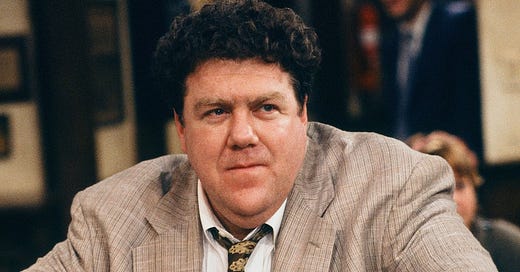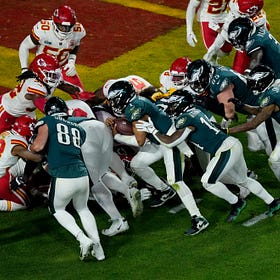Around the Horn's swan song, the Tush Push's weird adolescence, and Norm Peterson's brilliance (2002)
An ending, a middle, and a handful of cold opens.
This is Throwbacks, a newsletter by me, Michael Weinreb, about sports, history, culture and politics, and everything in-between.
If you like what you read, please click the button below, join the mailing list for FREE and please share, on social media or through e-mail or however you feel comfortable sharing.
And if you’ve been reading for a while, please consider a paid subscription to unlock certain posts and help keep this thing going—you’ll also get full access to the historical archive of over 250 articles. (Click here and you’ll get 20 percent off either a monthly or annual subscription for the first year.)
(If your subscription is up for renewal, just shoot me an email and I’ll figure out a way to get you that discount, as well. If you cannot afford a paid subscription and would like one, send me an email and I’ll comp you one, no questions asked.)
I.
Here is how newspaper television critics greeted the debut of Around the Horn on ESPN in 2002, a show that featured some of their own columnists gamifying their own hot takes:
In the Los Angeles Times, Mike Penner compared it unfavorably to the sound of a dentist’s drill.
In the Dayton Daily News, Marc Katz referred to it as “splatter paint with words.”
In the Chicago Tribune, Ed Sherman lamented that “nobody talks anymore” on television. “Everything is an 11 on the ‘Spinal Tap” scale.”
And in the Newport News Daily Press, Jim Hodges noted that it seemed to mark the end of newspaper columnists somehow viewing television and radio as competition, and recognizing that they had to wade into the muck if they hoped to survive.
In the end, 23 years later, as Around the Horn nears the end of its run, there now seems to be a movement to celebrate Around the Horn as a colossally influential show that altered the way we talk about sports, without actually examining whether that influence was a good thing or a bad thing.
“ESPN’s “Around the Horn” was not some great show,” writes The Athletic’s
. “Never was.”Perhaps that strikes you as an especially bitter take. Perhaps media was destined to move in this direction with or without Around the Horn. Perhaps you came to enjoy this show, in part because it evolved, under its likable host Tony Reali, from a showcase for middle-aged sportswriters into an incubator for younger writing (and eventually broadcasting) talent that was more willing and more able to express nuanced and intelligent takes in a very short time frame, from
to Mina Kimes to Kevin Clark. But I would argue that a show can be influential without actually being great.And here is where I am going to unleash my own flaming hot take, which is that I do not think Saturday Night Live is a particularly great show.
Oh, sure, it has its moments, and it has an undeniable cultural influence. What I mean by this is that there are dozens of better sketch-comedy shows, and dozens of funnier sitcoms, and several sharper news satires. But Saturday Night Live is more important than them all for one reason: It is a first-rate incubator of talent. Most of the stars it produces go on to do far better and far more interesting things than they ever did on SNL, and this is its legacy, and this is why it matters, and I would argue that the same thing will hold true for Around the Horn.
II.
I stand by what I wrote back in 2023 about the shrill defense of the so-called “Tush Push” in the NFL…
In every single American sport, dozens of rules have been altered because of the tactics of a single athlete or franchise. Dominance is not an excuse; dominance is very often the reason why rules are changed, like when the NBA widened the lane to make things more difficult for George Mikan and Wilt Chamberlain, and or when Major League Baseball lowered the pitchers’ mound because of the sheer dominance of Bob Gibson. This is what sports are; they are living, breathing organisms, constantly falling out of balance and back into balance, and to deny that is as idiotic as claiming that a founding document written in 1787 should not evolve to reflect the whims of a changing society.
"A Palpably Unfair Act" (1969)
This is Throwbacks, a newsletter by me, Michael Weinreb, about sports, history, culture and politics, and everything in-between. Welcome to all new readers/subscribers, and if you like what you’re reading, please join the mailing list and share, on social media or through e-mail or however you feel comfortable sharing. (
That said, I found Seth Wickersham’s account of the recent failed vote over the banning of the “Tush Push” to be incredibly amusing, particularly this part:
Toward the end of a speech that lasted close to an hour, (Philadelphia Eagles owner Jeffrey) Lurie made an analogy, telling the room that regardless of whether the play was banned, it was a "win-win" for the Eagles, adding that it was "like a wet dream for a teenage boy" to create a play that was so successful that the only way for it to be stopped was for it to be banned.
I do not know what sort of fully grown human being associates a bruising collision of 22 grown men with adolescent eroticism, but I suppose this is always a possibility whenever a bunch of mercurial male billionaires gather together in a room and act like the brothers of Delta Tau Chi. Over the course of the history of the NFL—going back to the days when the shrill and overtly racist Washington owner George Preston Marshall presided over the room—its owners have proven themselves to be capable of some pretty weird shit, and now they’ve done it again.
As The Athletic’s Diana Russini reports, Lurie actually attempted to frame this as a way for owners to act as “stewards of the game,” without acknowledging that being a steward of the game means ensuring the essential fairness of the game you’re meant to steward. But one thing mattered more than fairness, which is that no one tells a billionaire what to do in modern-day America. “It was a vote about process more than what was right,” one league source told Russini. “People don’t like the NFL telling people how to vote.”
That, of course, is how every healthy discussion involving puberty should end: You wind up doing the wrong thing just to prove a point.
III.
This, to me, is the apotheosis of late 20th-century television comedy:
I would argue that there has never been a better one-liner in the history of television. This line is a mantra that runs through my head every time a day goes completely sideways. And yet there are many others that come close, and a number of them emerged from the mouth of George Wendt, the character actor who played barfly Norm Peterson on Cheers, and who died this week at age 76.
The way Wendt could deliver a line or a look or even just serve as a prop in a Cheers cold open was part of what made it the most purely likable show of its generation. It was also, as I wrote recently, a show that effortlessly folded sports into its plots, to the point that I still think about it all the time.
This newsletter is very much a work in progress. Thoughts? Ideas for future editions? Contact me via twitter or at michaeliweinreb at gmail, or leave a comment below. If you enjoyed this newsletter, please subscribe and/or share it with others.







My favorite Norm-ism:
"Women: You can't live with them, pass the beer nuts."